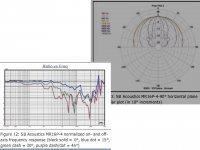Ok. I've got my speakers at last 🙂.
I did some rough measurements.
Satori MR16P on axis and about 45 degrees. I think 2.7 Khz is good point for xover with tweeter.
But my urgent problem is cabinet. I did some SB23NRX TS measurements and my data is close to manufacturer's. And what i have to do? 🙂 Whom i have to believe to? Optimal volume of vented box differs significantly. 40-43L by Troels or 65-74L by factory datasheet. 😕
I did some rough measurements.
An externally hosted image should be here but it was not working when we last tested it.
Satori MR16P on axis and about 45 degrees. I think 2.7 Khz is good point for xover with tweeter.
But my urgent problem is cabinet. I did some SB23NRX TS measurements and my data is close to manufacturer's. And what i have to do? 🙂 Whom i have to believe to? Optimal volume of vented box differs significantly. 40-43L by Troels or 65-74L by factory datasheet. 😕
The SB23NRX45-8 I used matched the SB_specs, and worked well in a QB3 ported 2.5cuft(70l-75l) volume tuned to 28Hz with flanged 3" port 7.5" long. Combining a room sim before you cut wood couldn't hurt.
The Voice Coil Jan 2017 measurements on the MR16P-4 suggest that a crossover under 2kHz is desirable to maintain a 2-Pi polar pattern match with a dome tweeter. Voice Coil also has measurements on your tweeter.
https://www.scribd.com/document/337615471/SBA-MR16P-4-Voice-Coil-January-2017#
The Voice Coil Jan 2017 measurements on the MR16P-4 suggest that a crossover under 2kHz is desirable to maintain a 2-Pi polar pattern match with a dome tweeter. Voice Coil also has measurements on your tweeter.
https://www.scribd.com/document/337615471/SBA-MR16P-4-Voice-Coil-January-2017#
Attachments
Voice Coil also has measurements on your tweeter
What is magazine №?
2.7Khz can be doable but if you load the tweeter on a waveguide, and if its the SB26st series, its very concave so not a good cnadidate for such use. Otherwise, follow the advise above and crossover lower, these tweeters can handle lower crossover point with no issues.
If you point the port downwards as mentioned by Linesource, make sure to add the spacing between the floor and the box bottom to the port dimensions, otherwise it would work as a long port. Best way to verify it is with either an acoustic (look for a null below 60Hz, thats your tunning) or using an impedance sweep (lowest point between the double peaks).
If you point the port downwards as mentioned by Linesource, make sure to add the spacing between the floor and the box bottom to the port dimensions, otherwise it would work as a long port. Best way to verify it is with either an acoustic (look for a null below 60Hz, thats your tunning) or using an impedance sweep (lowest point between the double peaks).
- Home
- Loudspeakers
- Multi-Way
- 3way Discovery or...

